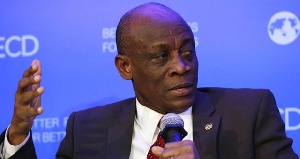Export development finance institution, EximBank Ghana, has been launched to bolster government’s quest for an aggressive and sustainable export-led economy.
The EximBank has long been touted by economists and business minded think-tanks as the surest relief package whose effective operation could tackle the issue of lack of access to finance stifling the growth of firms in export and import business.
The establishment of the bank is expected to improve the country’s export competitiveness, to rake in much needed foreign exchange and improve balance of trade.
At the launch in Accra, Finance Minister, Seth Terkper, said: “EximBank Ghana is government’s initiative to substantially support the private sector and other state enterprises whose operations are linked to export/import.
This is a strategy for structured growth as it will cushion exporters to compete favourably through guarantees and export credits as well as broadly enhance the country’s muscles in terms of international trade.”
The new bank is an amalgamation of the Export Finance Company Limited (EFCL), Eximguaranty Company Limited (ECL) and the Export Development and Agricultural Investment Fund (EDAIF).
Parliament passed the Ghana Export-Import Bank Act in the first quarter of this year, and was followed by the swearing in of a board of directors in July.
With total imports outstripping total exports for more than three decades, Ghana’s total exports as at December 2015 rose to US$10.36billion as against an import of US$13.47billion.
This resulted in a total deficit of US$3.11billion, representing 8.3percent of GDP, a situation government said it is determined to overturn.
In August 2016, the nation’s total exports stood at US$6.79billion, whiles imports stood at US$8.78billion, leading to a total deficit of US$1.98billion, which represents 4.6percent of GDP.
Key business associations, such as the Association of Ghana Industries (AGI), the Federation of Associations of Ghanaian Exporters (FAGE), the Ghana Union of Trade Associations (GUTA) and the Ghana National Chamber of Commerce and Industry (GNCCI), have long banked their hopes on the EximBank
The Finance Minister said EximBank will not be an isolated enterprise, urging strong collaboration between the bank and related business associations to live up to its billing.
Products to be offered by the bank include trade finance facilities and export capability creation facilities, that will be geared towards building the competence of businesses in the impex sector.
Special focus areas of the bank include the cushioning of small and medium enterprises, the agricultural value chain and support for rural industrialisation, as well as other viable ventures that lack assistance from the commercial banks.
Board Chairman of the bank, Prof. Richard Bani, told the B&FT in an interview, that the bank’s core objective will be to facilitate international trade by focusing on companies and industries that have the export potential.
“For those companies that are already into the export business, we want to increase the volume of their exports so as to increase the inflow of foreign exchange as well as stabilise the cedi,” he said.
Business News of Thursday, 1 December 2016
Source: B&FT

















